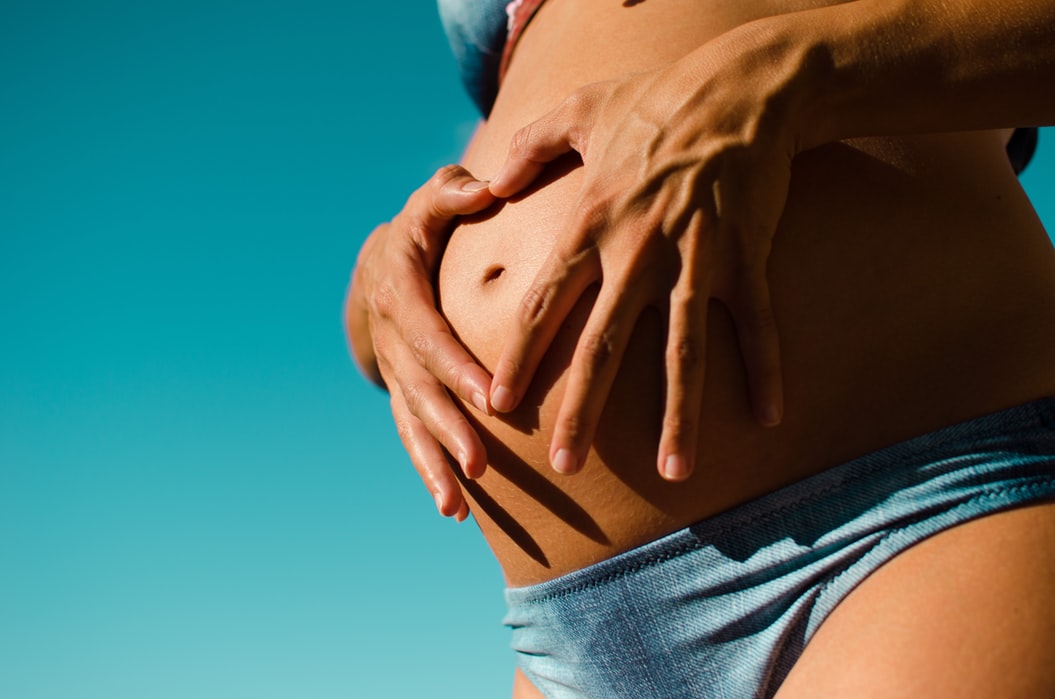Along with giving up your weekly sushi habit, swearing off caffeine, and kissing alcohol goodbye, pregnancy comes with some rules when it comes to skin care. Knowing what products you can and can’t use may be a shock to you. Like, I had no idea that using my eye-wrinkle-be-gone cream was a big no-no while I was pregnant. I couldn’t even tell you why it was bad even if I was asked at gunpoint, but it was just one of those things that’s like the opposite of Nike: you just don’t do it.
But don’t freak out and throw away all your sheet masks just yet (what else would you do on Sunday nights??). Navigating the dos and don’ts of your skincare routine while being pregnant is tough, so I spoke with NYC-based dermatologist Dr. Dendy Engelman to help set the record straight on pregnancy-safe skincare.
Skin Issues In Pregnancy
If you thought you had finally gotten rid of your sudden-onset adult acne, brace yourself, because your skin could be in for some surprises. Because of the fluctuating hormones in your body during pregnancy, chances are, your skin will change. “Unfortunately for some, the influx of hormones brings acne,” notes Engelman. But, be careful how you treat it. She advises, “be forewarned some acne products (prescription medications like Accutane, Retin-A and tetracycline) are unsafe to use during pregnancy, so be sure to speak with your dermatologist before using any products.”
Accutane being unsafe to use during pregnancy is kind of common knowledge, but be sure to check the labels of any wrinkle creams for Retin-A and to ask your doctor about any antibiotics or creams containing tetracycline. There are also doctors that say salicylic acid—which is found in like, all of your pharmacy acne creams and washes—might not be totally chill either, so make sure to talk to your dermatologist if you are pregnant or are planning to become pregnant.
What Not To Use
There is, unfortunately, a kind of long list of ingredients to steer clear of during pregnancy, according to Dr. Engelman. They include:
Fragrances: Seems weird, but according to Dr. Engelman, fragrances can contain harmful chemicals “that are linked to cancer and nervous system issues.” You can avoid all that sh*t by looking for things labeled fragrance-free and avoiding anything with the words “parfum, perfume, linalool, limonene, eugenol, citronellol, geraniol or cinnamal,” which are all just fancy ways of saying “we put this sh*t in here to make this smell good.”
BPA: The long and short of BPA is that it’s used in plastics and, as Engelman explains, “disrupts the endocrine system” which can lead to “breast/prostate cancer, infertility, heart disease, and diabetes,” and if that wasn’t concerning enough, “fetuses exposed to BPA have been linked to developmental issues and behavioral problems.” No, it’s totally cool, it’s not like you have enough to stress about when you’re trying to grow a life inside you or anything.
Formaldehyde: Before you come at me for this being obvious, there are people out there who feed their babies Mountain Dew, so like, you can never be too cautious. Dr. Engelman says, “Some hair-straightening procedures use this chemical during the process. Even some nail polish brands still contain formaldehyde, putting your body and salon workers at risk.” She advises, “look for nail polishes labeled 3-Free or 5-Free which do not use this chemical. Jin Soon nail polishes are a great brand without formaldehyde.”
Sodium Lauryl Sulfate: When it isn’t making your soap sudsy, sodium lauryl sulfate is busy being irritating. “The issue is the level of concentration of this chemical, is too irritating by cosmetic standards. Our body is not able to break this chemical down and with prolonged exposure, it can cause issues with the nervous system and kidney and liver function. If ingested, it can cause nausea, vomiting, or diarrhea.”
Parabens: You’ve probably seen lots of shampoos boasting a lack of these bad boys lately, and Dr. Engelman says it’s for good reason. “These chemicals have been linked to breast cancer as well as affecting the reproductive system. They are mainly used to preserve products, found in everything from foundations to styling gel.” Cool, is there anything I’m using every day that won’t kill me? Asking for myself.
Dr. Engelman also says to watch out for phthalates, which are linked to reproductive issues; diethanolamine, which is linked to birth defects; oxybenzone, which is linked to low birth weight and type 2 diabetes; and dihydroxyacetone, which is linked to DNA damage. Sooo am I just washing my face with mashed-up avocados for the next nine months, or…? WHAT DO I DO??
What Can You Use?
The list of no-nos seems long and like, complicated, which sucks considering you’re also worried about a college fund, what clothes you fit into, and what color the nursery should be. When I was first thinking about getting pregnant, I literally brought all the products I used on a day-to-day basis and asked my dermatologist about each. Dr. Engelman says, as a rule, you can swap your retinoid-heavy cream for glycolic acid; quit using chemical-based sunscreen and instead opt for mineral block sunscreen using either titanium dioxide or zinc oxide (like this Eryfotona Actinica Sunscreen or this Eryfotona Ageless Tinted Mineral Sunscreen from ISDIN), and ditch your heavy face washes and toners for witch hazel.
It may seem like a huge headache and one more thing for you to worry about during pregnancy, but making the switch to better and more natural products is better for you, and your baby, in the long run.
Images: Ignacio Campo, Unsplash



















































